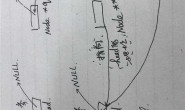后台的意思可能就是将所有输出重定向的意思,我猜。
FREOPEN
Section: POSIX Programmer””s Manual (P)
Updated: 2003
——————————————————————————–
NAME
freopen – open a stream
SYNOPSIS
#include <stdio.h>
FILE *freopen(const char *restrict filename, const char *restrict mode,
FILE *restrict stream);
DESCRIPTION
The freopen() function shall first attempt to flush the stream and close any file descriptor associated with stream. Failure to flush or close the file descriptor successfully shall be ignored. The error and end-of-file indicators for the stream shall be cleared.
The freopen() function shall open the file whose pathname is the string pointed to by filename and associate the stream pointed to by stream with it. The mode argument shall be used just as in fopen().
The original stream shall be closed regardless of whether the subsequent open succeeds.
If filename is a null pointer, the freopen() function shall attempt to change the mode of the stream to that specified by mode, as if the name of the file currently associated with the stream had been used. It is implementation-defined which changes of mode are permitted (if any), and under what circumstances.
After a successful call to the freopen() function, the orientation of the stream shall be cleared, the encoding rule shall be cleared, and the associated mbstate_t object shall be set to describe an initial conversion state.
The largest value that can be represented correctly in an object of type off_t shall be established as the offset maximum in the open file description.
RETURN VALUE
Upon successful completion, freopen() shall return the value of stream. Otherwise, a null pointer shall be returned, and errno shall be set to indicate the error.
ERRORS
The freopen() function shall fail if:
EACCES
Search permission is denied on a component of the path prefix, or the file exists and the permissions specified by mode are denied, or the file does not exist and write permission is denied for the parent directory of the file to be created.
EINTR
A signal was caught during freopen().
EISDIR
The named file is a directory and mode requires write access.
ELOOP
A loop exists in symbolic links encountered during resolution of the path argument.
EMFILE
{OPEN_MAX} file descriptors are currently open in the calling process.
ENAMETOOLONG
The length of the filename argument exceeds {PATH_MAX} or a pathname component is longer than {NAME_MAX}.
ENFILE
The maximum allowable number of files is currently open in the system.
ENOENT
A component of filename does not name an existing file or filename is an empty string.
ENOSPC
The directory or file system that would contain the new file cannot be expanded, the file does not exist, and it was to be created.
ENOTDIR
A component of the path prefix is not a directory.
ENXIO
The named file is a character special or block special file, and the device associated with this special file does not exist.
EOVERFLOW
The named file is a regular file and the size of the file cannot be represented correctly in an object of type off_t.
EROFS
The named file resides on a read-only file system and mode requires write access.
The freopen() function may fail if:
EINVAL
The value of the mode argument is not valid.
ELOOP
More than {SYMLOOP_MAX} symbolic links were encountered during resolution of the path argument.
ENAMETOOLONG
Pathname resolution of a symbolic link produced an intermediate result whose length exceeds {PATH_MAX}.
ENOMEM
Insufficient storage space is available.
ENXIO
A request was made of a nonexistent device, or the request was outside the capabilities of the device.
ETXTBSY
The file is a pure procedure (shared text) file that is being executed and mode requires write access.
The following sections are informative.
EXAMPLES
Directing Standard Output to a File
The following example logs all standard output to the /tmp/logfile file.
#include <stdio.h>
…
FILE *fp;
…
fp = freopen (“/tmp/logfile”, “a+”, stdout);
…
APPLICATION USAGE
The freopen() function is typically used to attach the preopened streams associated with stdin, stdout, and stderr to other files.
RATIONALE
None.
FUTURE DIRECTIONS
None.
SEE ALSO
fclose() , fopen() , fdopen() , mbsinit() , the Base Definitions volume of IEEE Std 1003.1-2001, <stdio.h>
COPYRIGHT
Portions of this text are reprinted and reproduced in electronic form from IEEE Std 1003.1, 2003 Edition, Standard for Information Technology — Portable Operating System Interface (POSIX), The Open Group Base Specifications Issue 6, Copyright (C) 2001-2003 by the Institute of Electrical and Electronics Engineers, Inc and The Open Group. In the event of any discrepancy between this version and the original IEEE and The Open Group Standard, the original IEEE and The Open Group Standard is the referee document. The original Standard can be obtained online at http://www.opengroup.org/unix/online.html .
——————————————————————————–
Example
/* FREOPEN.C: This program reassigns stderr to the file
* named FREOPEN.OUT and writes a line to that file.
*/
#include <stdio.h>
#include <stdlib.h>
FILE *stream;
void main( void )
{
/* Reassign “stderr” to “freopen.out”: */
stream = freopen( “freopen.out”, “w”, stderr );
if( stream == NULL )
fprintf( stdout, “error on freopen\n” );
else
{
fprintf( stream, “This will go to the file “”freopen.out””\n” );
fprintf( stdout, “successfully reassigned\n” );
fclose( stream );
}
system( “type freopen.out” );
}
Output
successfully reassigned
This will go to the file “”freopen.out””




